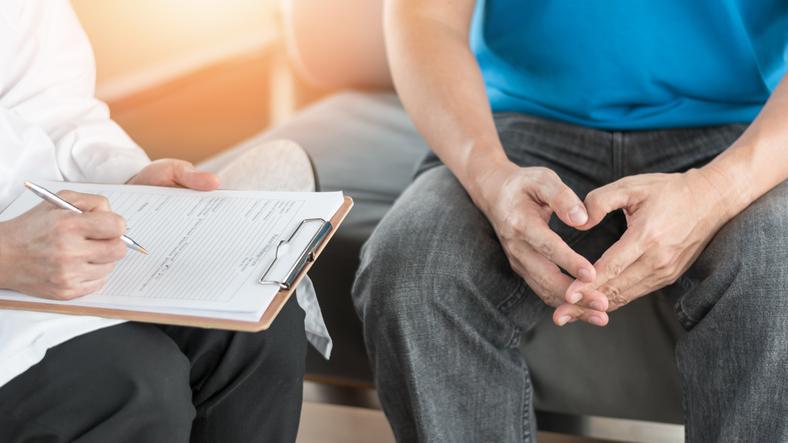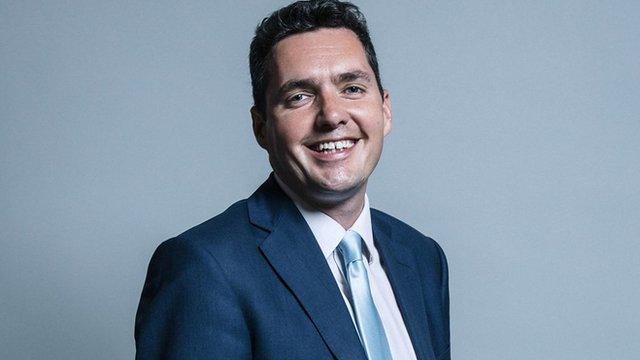Brexit anxiety: 'I can't sleep because of it'
- Published

Paul Groom says Brexit-related stress contributed towards his heart attack in 2017
Tory MP Huw Merriman revealed this week he has lost four inches from his waistline as a result of Brexit-related stress, and it has since emerged that civil servants around the UK were offered counselling to help prepare for no deal.
But it is not just those directly involved in the political process who are suffering. Many people have contacted the BBC to say how recent political developments - or a lack of - are having an impact on their mental state.
Paul Groom, 61, had a heart attack two years ago and says both he and his cardiologist believe Brexit-related anxiety contributed towards it.
"I think about Brexit every day, no matter what," says Mr Groom, who retired to France with his wife two years ago.
"We were living in Devon. We planned to sell our UK house and put the equity into our future financial plan. Then came Brexit.
"Our whole lives have been put on hold since then. We, along with many others, have no idea of where our lives are going to end up."
"Me and my wife are both losing sleep over it," adds Mr Groom, who voted to remain in 2016. He worries that he may have to move back to the UK.
"At the moment, if I wake up in the night the first thing I do is check my phone to see what else has happened in Parliament."
The worry and subsequent lack of sleep, Mr Groom believes, has negatively affected his physical health as well as his mental wellbeing.
"I've never had heart issues before," he says. "Lifestyle is the main cause but, as my cardiologist says, the stress doesn't help.
"It makes you do things you wouldn't have done otherwise - you eat differently, you maybe drink a bit more, you worry more, you have less sleep and all this can contribute to health issues like mine."
'It's ridiculous'
And it's not just those who voted remain who are suffering anxiety as a result of the UK's current political journey.
Rachel Muse, 50, who voted to leave in 2016, says she thinks about Brexit every day.
"It's something that very much plays on my mind," says Ms Muse, who is a chef from Salisbury.
"It's ridiculous but I'm finding it very stressful."

Rachel Muse says she is avoiding the news in an effort to avoid Brexit-related stress
She adds: "I don't have many hobbies - work takes up a lot of my time - but my main hobby is following the news, finding out what's going on in Westminster and Brussels.
"I would normally make a point of listening to the news. I listen to PM and the Six O'Clock News because I want to know what's going on and how it's going on."
Recently, however, Ms Muse says she is no longer tuning in.
"I'm procrastinating so I don't have to listen to it," she says - adding she no longer watches the News at Ten so she doesn't have to think about Brexit before going to sleep.
But is being this affected by current affairs a common occurrence? Or are we living in extraordinary times?
'Constant stream of information'
"I think that's a really important question," says Dr Louise Theodosiou from the Royal College of Psychiatrists.
"In the past decade, our awareness of current affairs has escalated.
"Going back a decade, people I work with might have got up in the morning and switched on the radio or the television, but it wouldn't be a situation where they could immediately have an update on debates that happened overnight.
"You can now get news sent to you very rapidly - but what's challenging about that is obviously the information is presented in a succinct form, which means people might be getting headlines but not developing a full understanding.
"Yes, it's right to keep yourself informed because information can reduce anxiety - but the constant stream of information can be really challenging."

Brexit anxiety - who is affected?
A survey of more than 2,000 people carried out in March by research company Britain Thinks, external suggested that:
64% of people feel anxiety relating to Brexit is negatively affecting Britons' mental health
Women (70%) are more likely than men (58%) to be concerned about the effect of Brexit on mental health
83% of people are "fed up" of seeing Brexit on the news
84% of people are unimpressed with both Labour and the Conservatives' handling of Brexit

So, what can people do to reduce that anxiety?
"The first thing to do is to tell people around you how you are feeling," says Dr Theodosiou. "We can all normalise something and put it into context and introduce a sense of humour."
Another important factor, Dr Theodosiou adds, is to "spend time away from the stream of information in a constructed way". For example, avoiding technology during meal times or when you wake up in the morning.
Finally, Dr Theodosiou says, gentle exercise can help alleviate stress.
"Even things like walking up and down stairs if you're getting public transport, taking the opportunity to walk a little bit where possible, can make a difference."
- Published4 April 2019

- Published2 April 2019
